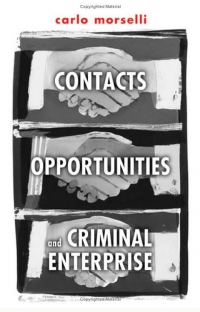Contacts are pivotal to the criminal experience and it is generally through co-offending associations that a variety of criminal opportunities become available to any given offender. However, the scope and quality of an offender’s co-offending associations and inherent opportunities are influenced by the structure of such personal criminal networks. Using insights from studies on legitimate enterprise and past research on organized crime settings, this book presents brokerage configurations as networks that offer a competitive advantage to participants in criminal enterprise. Brokers are more likely to spread out their investments in timely and insulated fashion. For criminal entrepreneurs, such networks disperse available opportunities in an efficient and less constraining manner, while reducing the risks of personal exposure and detection. To demonstrate, criminal memoirs are used as the principal data sources in retrieving the core working networks, key activities, and life transitions throughout the careers of two distinct criminal entrepreneurs. The end result of this approach is a common framework that permits the explanation of both hierarchically and loosely structured settings of criminal enterprise.

Carlo Morselli (2005), Contacts, Opportunities and Criminal Enterprise, Toronto : Presses de l'Université de Toronto.
BackAttention - Votre version d'Internet Explorer est vieille de 21 ans et peut ne pas vous offrir une expérience optimale sur le site du CICC. Veuillez mettre à jour votre ordinateur pour une expérience optimale. Nous vous recommandons Firefox ou Chrome, ou encore ChromeFrame si vous êtes dans un environnement corporatif ou académique dans lequel vous ne pouvez pas mettre à jour Internet Explorer.